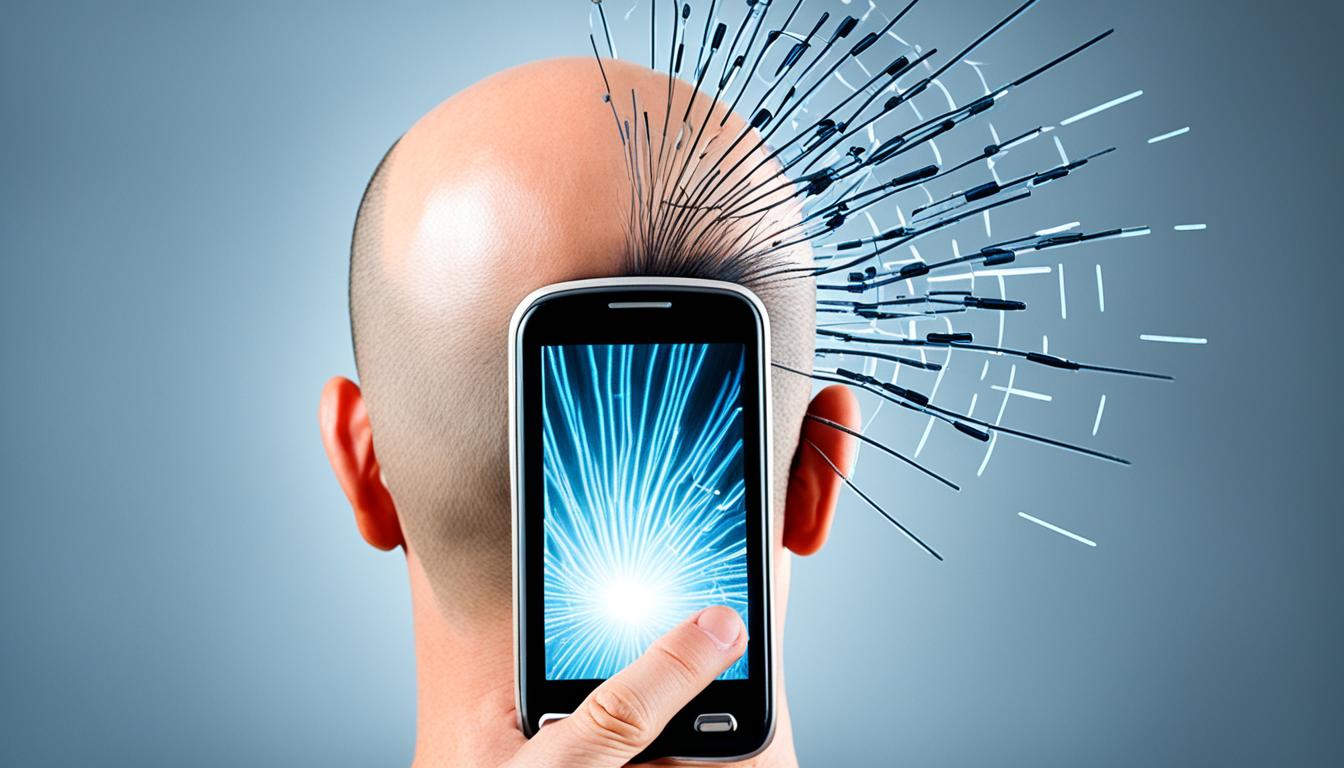Did you know that an estimated 5 billion people worldwide use cell phones? That’s nearly two-thirds of the global population! With such widespread usage, it’s natural to wonder about the potential health effects of mobile phone radiation. One concern that has gained attention is the possibility of hair loss due to exposure to phone radiation.
Key Takeaways:
- Cell phones emit radiofrequency (RF) waves, a form of non-ionizing radiation.
- RF waves from cell phones have much lower energy than ionizing radiation and do not have enough energy to break chemical bonds or heat body tissues significantly.
- Studies have not found a clear link between cell phone use and hair loss.
- Non-ionizing radiation, including RF waves, is generally considered safe at typical levels of exposure.
- Expert organizations agree that more research is needed to determine any long-term effects of cell phone radiation.
How Do Cell Phones Work and Can They Cause Tumors?
Cell phones have become an integral part of our daily lives, enabling us to stay connected with others. However, concerns have been raised about the potential health effects of cell phone radiation, particularly in relation to tumors and hair loss.
Cell phones emit radiofrequency (RF) waves, a form of non-ionizing radiation. Unlike ionizing radiation, which has enough energy to damage DNA and potentially cause cancer, the energy from RF waves is much lower. It is important to note that RF waves do not have enough energy to break chemical bonds or generate significant heat in body tissues.
Exposure to RF waves primarily occurs when a person holds the cell phone close to their head during a call. This proximity increases the level of exposure to RF waves, raising concerns about potential health risks.
Extensive research has been conducted to investigate the potential link between cell phone use and tumors, particularly in the brain and head and neck area. While some studies suggest a possible increased risk, most studies have not found a clear connection between cell phone use and the development of tumors or hair loss.
It is important to understand that scientific studies on this topic have produced mixed results. Some studies indicate a potential association between long-term cell phone use and tumors, but these findings have not been consistently replicated.
Furthermore, the overall exposure to RF waves from cell phones is significantly below safety limits established by regulatory agencies. These safety limits are designed to protect individuals from any potential adverse effects of non-ionizing radiation.
“While some studies suggest a possible increased risk, most studies have not found a clear connection between cell phone use and cancer or hair loss.”
As the scientific community continues to conduct research in this field, it is essential to consider the cumulative evidence and the consensus among expert organizations. Based on the current body of knowledge, the risk of developing tumors or experiencing hair loss due to cell phone radiation is considered to be low.
| Myth or Fact: Is There a Link Between Cell Phone Radiation and Hair Loss? |
|---|
| Cell phones emit non-ionizing radiation, which is different from the ionizing radiation that can cause cancer. |
| Cell phone radiation does not have enough energy to break chemical bonds or generate significant heat in body tissues. |
| Exposure to RF waves from cell phones primarily occurs when the phone is held close to the head during a call. |
| Many studies have investigated the potential link between cell phone use and tumors, but the results have been inconclusive. |
| The overall risk of developing tumors or hair loss from cell phone radiation is considered low. |
Given the currently available evidence, it is advisable to follow the established guidelines for safe cell phone use. These guidelines include using hands-free options or speakerphone mode and keeping the cell phone away from the body when not in use.
The Safety of Non-ionizing Radiation and Conclusion
Non-ionizing radiation, such as the RF waves emitted by cell phones, is generally considered safe when experienced at typical levels of exposure. Unlike ionizing radiation, which has enough energy to cause direct harm to human tissues and DNA, non-ionizing radiation poses significantly lower risks. While ongoing research and debates continue to explore the potential long-term health effects, expert organizations have not classified the RF waves from cell phone use as a definitive cause of cancer or hair loss.
Although some studies have suggested a possible link between cell phone use and tumors, many others have not been able to replicate these findings. It is crucial to note that typical levels of exposure to RF waves from cell phones are significantly below the thresholds that can cause harm. Therefore, the overall risk of experiencing hair loss or other health problems from mobile phone radiation is considered to be low.
As scientific research continues to advance, it is essential to keep up-to-date with the latest findings and recommendations. At present, the consensus among expert organizations is that the use of cell phones, despite emitting non-ionizing radiation, does not pose a significant risk of hair loss or other health complications. While practicing safe and responsible mobile phone use is always recommended, we can continue to enjoy the benefits of these devices without undue concern about hair loss resulting from cellphone radiation.
FAQ
Is it true that mobile phone radiation can cause hair loss?
There is currently no strong evidence to suggest that exposure to radiofrequency (RF) waves emitted by cell phones causes noticeable health effects like hair loss. Expert organizations agree that more research is needed to determine any long-term effects.
How do cell phones work and can they cause tumors or hair loss?
Cell phones emit non-ionizing radiation, specifically RF waves. The energy from RF waves is much lower than ionizing radiation and does not have enough energy to cause direct harm to human tissues. While some studies suggest a possible increased risk, most studies have not found a clear connection between cell phone use and cancer or hair loss.
What is the safety of non-ionizing radiation from cell phones?
Non-ionizing radiation, such as RF waves from cell phones, is generally considered safe at typical levels of exposure. Although there is ongoing debate and research regarding possible long-term health effects, expert organizations have not classified RF waves from cell phone use as a definitive cause of cancer or hair loss. The overall risk of hair loss or other health problems is considered low.

